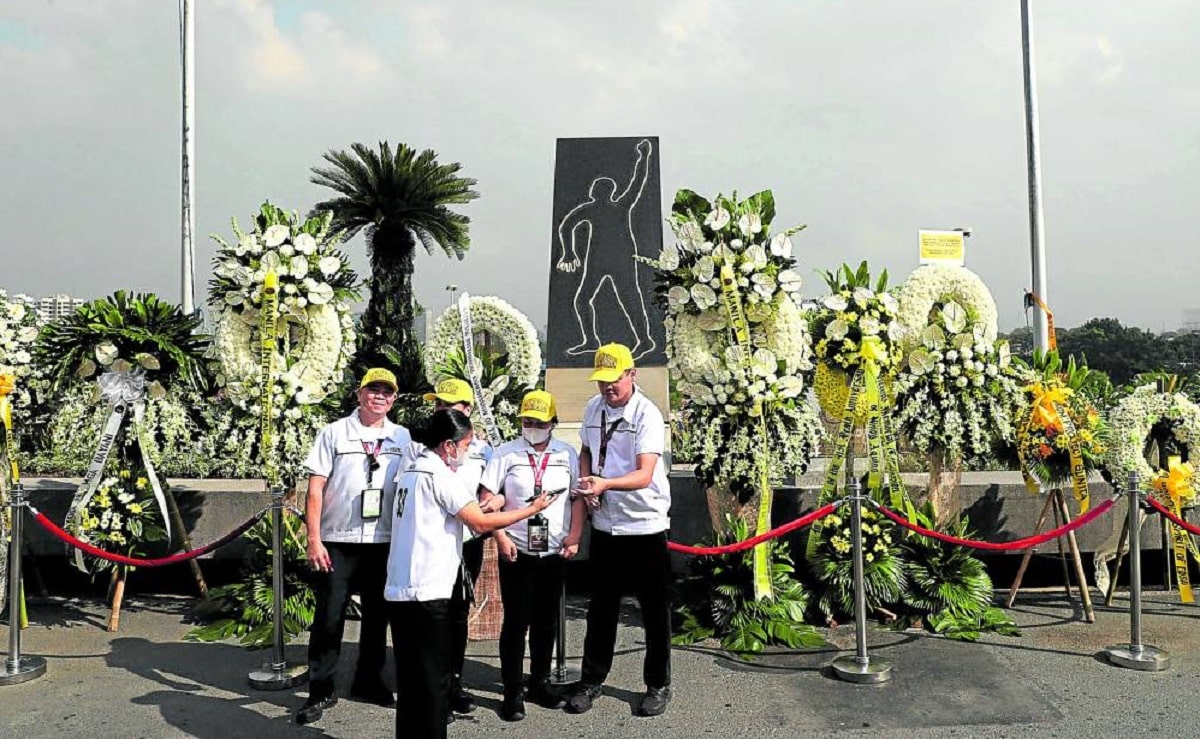
At the international airport now named in Aquino’s honor, floral wreaths are placed and a simple ceremony is held at the monument recalling his murder on Aug. 21, 1983. —Photo by Marianne Bermudez
MANILA, Philippines — The Marcos administration’s decision to move the commemoration of Ninoy Aquino Day from Aug. 21 to Aug. 23 failed to dampen—if not make more poignant—the yearly memorial for those who take its meaning to heart.
At the airport where former Sen. Benigno “Ninoy” Aquino Jr. was shot dead while under military escort on Aug. 21, 1983, shortly upon arrival from years of exile in the United States, the occasion again gathered civil society leaders and groups bent on keeping the memory of the struggle against the Marcos dictatorship alive.
READ: A day to remember, holiday or not
Floral wreaths were laid and clenched fists were raised at the monument to the murdered opposition leader at the international gateway that now bears his name, in a morning program marking his 41st death anniversary.
The simple rites concluded with the yellow-shirted participants singing the patriotic hymn “Pilipinas Kong Mahal” and the anti-Marcos protest anthem “Bayan Ko.”
Among those in attendance were representatives of the August Twenty One Movement (Atom), Spirit of Edsa Foundation, Project Gunita, Bantayog ng mga Bayani Foundation, and Chino Roces Foundation; history researcher Patrick Claudio of the Human Rights Violations Victims’ Memorial Commission, Cecile Guidote-Alvarez of Earth Savers Movement, lawyer Manuel “Chel” Diokno, and historian Michael Charleston “Xiao” Chua.
The National Historical Commission of the Philippines was represented by deputy executive director Alvin Alcid.
Two eyewitnesses to the Aquino murder, airline technician Ramon Galang and Rebecca Quijano—or the so-called Crying Lady—also came for commemoration, according to a statement from the Manila International Airport Authority.
Most of the participants later joined the Atom-led motorcade dubbed “Ride On Against Revision!” from Baclaran Church to Manila Memorial Park in Parañaque City, where a Mass was held at the Aquino family tombs.
What matters now
“The things he fought for are the same things we still need to fight for today,” former Sen. Bam Aquino said of his slain uncle, speaking to reporters covering the Mass.
Even with a Marcos scion now in power, Bam Aquino said, what matters in honoring Ninoy’s life and legacy is his “desire … to fight for democracy, fight for human rights and to ensure that every Filipino family can have a decent life.”
“He’s just one of the many Filipinos who died and were imprisoned and tortured at the time [of martial law],” he added. “And even if he wasn’t able to see what transpired after his death, I believe his life is being remembered for the heroism and inspiration he gave to those who needed to speak up and fight.”
For Chua, the commemoration of Ninoy’s death is a “natural and spontaneous” effect of what the “people saw, (which was) his sincerity to restore democracy.”
“The Filipinos witnessed his bravery, courage, and his love for the country, and because of that, many Filipinos were no longer afraid to fight for themselves, and they eventually reclaimed their power,” Chua said.
EO’s intentions
In statements marking the occasion, martial law survivors and activist groups decried President Marcos’ executive order (EO) that moved the nonworking holiday to Aug. 23.
The Marcos EO said the change was intended to create a long weekend that can help stimulate local tourism—an explanation that the groups didn’t buy.
For the Campaign Against the Return of the Marcoses to Malacañang, or Carmma, the move by President Marcos “intends to diminish the date’s significance.”
“August 21 is a showcase of the brutal lengths the Marcos dictatorship was willing to go to, to preserve itself in power,” the group stressed.
Project Gunita, a youth group preserving anti-Marcos documents, including media accounts of the dictatorship and its downfall, said moving the holiday was a “contradiction of basic historical facts.”
“That is why we must still remember to never let the culprits get away again with the brutal murder of Ninoy Aquino,” it said.Buhay ang Edsa Campaign Network said Wednesday’s rites “serve as a reminder that there will always be Filipinos ready to serve, fight and sacrifice for the nation.”
No time to plan ahead
Chua also agreed with the objections earlier raised by Albay Rep. Edcel Lagman, one of the leaders of the political opposition, that the Marcos EO—or any proclamation moving a holiday—should have been issued six months earlier as required under Republic Act No. 9492.
The EO was issued only on Aug. 15.
“We understand [the movement was for holiday economics], but it should have been done (six) months before, according to the law. Because it was announced just last week, the people were also not able to plan ahead for the long weekend,” Chua told reporters.